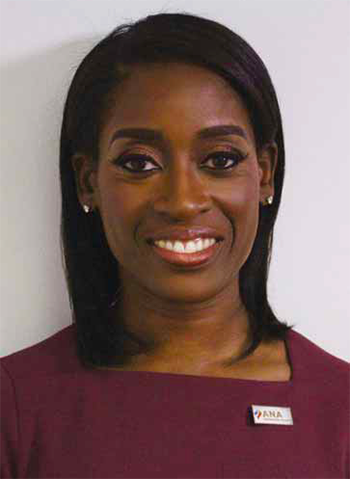Emerging Trends in Nursing

RNs embrace roles beyond the bedside.
Seun Ross, DNP, MSN, CRNP-F, NP-C, NEA-BC, is the director of Nursing Practice and Work Environment at the American Nurses Association (ANA). She’s published and lectured on numerous topics, including evidence-based practice, workforce management, RN work environment, competency, and mentoring novice RNs. Ross keeps looking ahead to what’s next in nursing, and she shared with us some of her thoughts on emerging roles and technology.
What are the current trends in nursing?

There continues to be substantial movement to community-based care; increasing numbers of RNs are in public and community health and practicing care coordination in the community. Nurses are opening businesses to help manage patients and working for Fortune 500 companies like Coca-Cola. More nurses are innovating—Johnson & Johnson has a great program, and ANA is advancing nurse-led innovation. It’s also exciting to see that more nurses are stepping into the political arena.
What brought about these changes?
Community-based nursing and the tech boom began ramping up in the late 1990s and early 2000s. To counter nursing shortages, electronic intensive care units (E-ICUs) were established, mostly in rural areas, to enable out-of-state nurses to monitor patients remotely via video camera. That’s when hospitals and other healthcare facilities started to look to robotics and machines for some nursing tasks, like stocking rooms and even monitoring patients.
Do you see robots doing more nursing tasks?
There’s a push for more automated caregivers like robots,machines, and artificial intelligence, all of which should be viewed as assistive to nursing and not a replacement. There are robots that can lift and turn patients, which canbe helpful to nurses. But these machines lack the intuition of a nurse, who, for example, can assess a clinical situation and use critical thinking to determine a course of action. Just because some tasks can be done by machines or robots doesn’t mean they should be.
How is technology playing a role in healthcare outside of the hospital setting?
We’re seeing significant changes in how healthcare is administered. There are pop-up clinics in malls (different from clinics within drugstores) where a patient can walk in and be seen by a nurse practitioner for a small fee. These clinics have virtually no equipment.
The technology is so advanced that a scan immediately takes heart rate and rhythm and other vital signs. Also, as the patient talks to the provider, the whole conversation is transcribed into the patient’s record.
Wearables like Fitbit and others have given consumers the opportunity to take better care of themselves, but these devices also benefit advanced practice registered nurses (APRNs). Consumers can monitor and send their vital signs directly to their APRN in real time (and it also gives the clinician the option to remotely monitor patients).
What are other opportunities for nurses?
For nurses who want to work in communities, I encouragepublic health nursing. It’s a field that gives nurses several options, not just working inschools, butthe opportunity to travel the United States or even the world and make a huge impact. Forthose who want to tap into their entrepreneurial spirit, concierge healthcare is booming. APRNs and RNs meet clients/patients wherever they are tocare for them. Originally startedas a service for the wealthy, now it’s in rural areas as a mechanism to increase access to care.
How can nurses explore these trends?
It’s a multipronged approach. Nursing schools should expand their community health education to prepare nurses for these trends and shift the focus from disease management to concentrate on partnering with patientsto achieve wellness.
There’s a common misconception that you must practice in a hospital before anything else, but that’s not true. Follow your interests. Do lots of reading, and not just nursing publications, but include Forbes and Modern Healthcare. Get plugged into philanthropic organizations that focus on healthcare and, of course, ANA. Having diversity of thought when contemplating your nursing career is essential.
Interview by Elizabeth Moore, MFA, a writer at ANA.
Article shared from American Nurse Today
Licensed Practical Nursing


How Can I Get Into a U.S. Nursing Degree as a Foreigner?
The demand for qualified nurses in the United States continues to grow, making nursing an attractive career path for students from around the world. If…
Share at FacebookShare at TwitterShare at PinterestShare at LinkedIn
WHY EARNING A BSN IS WORTH IT
Why Earning a Bachelor of Science in Nursing (BSN) Is Worth It—Especially at Sumner College Nursing has always been a calling, but today it’s also a…
Share at FacebookShare at TwitterShare at PinterestShare at LinkedIn
A BSN From Sumner College
Begin Your Nursing Career with a BSN from Sumner College in Oregon If you're looking to start a meaningful and rewarding career in nursing,…
Share at FacebookShare at TwitterShare at PinterestShare at LinkedIn
Meet Teresa: Sumner College Graduate
Associate Degree in Nursing Teresa, congratulations on your graduation! As you’ve embarked on your nursing journey, remember: ‘Nursing is not just a profession, it’s a…
Share at FacebookShare at TwitterShare at PinterestShare at LinkedIn
Meet Ana: Sumner College Graduate
Congratulations, Ana! Your hard work, heart, and perseverance have brought you to this incredible milestone. As you begin your journey in nursing, remember: “Nursing is…
Share at FacebookShare at TwitterShare at PinterestShare at LinkedIn
Meet Misty: Sumner College Graduate
Associate Degree in Nursing Misty, congratulations on your graduation! As you’ve embarked on your nursing journey, remember: ‘Nursing is not just a profession, it’s a…
Share at FacebookShare at TwitterShare at PinterestShare at LinkedIn
AI in Nursing: A Trial
AI Note-Taking Tool Gives Nurses More Time for Patients at East Lancashire Hospitals In a forward-thinking move to streamline healthcare and reduce administrative burdens, East…
Share at FacebookShare at TwitterShare at PinterestShare at LinkedIn
Bend Health Fair
Thank you to all who stopped by to say hi at the Bend Health Fair! What a great weekend! Have additional questions? Send us a…
Share at FacebookShare at TwitterShare at PinterestShare at LinkedIn
New Start, May 12!
Congratulations to our newest BSN cohort starting class on Monday in both Portland and Bend! Your new adventure awaits at Sumner College, Dream it Do…
Share at FacebookShare at TwitterShare at PinterestShare at LinkedIn
How Learning Style Impacts You
Welcome to “Understanding Your Learning Style” Unlock Your Academic Potential by Discovering How You Learn Best Have you ever wondered why some study methods work…
Share at FacebookShare at TwitterShare at PinterestShare at LinkedIn
RN Wages
A recent survey conducted by Incredible Health found that registered nurses (RNs) in Oregon earn an average annual salary of $98,630, or approximately $47.42 per…
Share at FacebookShare at TwitterShare at PinterestShare at LinkedIn
TEAS Exam Time!
The TEAS exam is a vital part of the admissions process and an important step toward your future in nursing. To help you prepare, we’ve…
Share at FacebookShare at TwitterShare at PinterestShare at LinkedIn
This week’s Information Sessions
Head over to one of our campuses for a great info session this week! In these sessions, you’ll learn about the application process, including how…
Share at FacebookShare at TwitterShare at PinterestShare at LinkedIn
Changing the Nursing Narrative
The American Nurses Enterprise (ANE- associated with American Nurses Association) has launched a bold new initiative aimed at redefining how society understands and measures the…
Share at FacebookShare at TwitterShare at PinterestShare at LinkedIn
Information Q&A
🌟 Discover Your Calling in Healthcare – Join Our BSN Info Session! 🌟 Sumner Nursing College | Bachelor of Science in Nursing 📅 Classes Begin:…
Share at FacebookShare at TwitterShare at PinterestShare at LinkedIn
Information Sessions
Are you ready to take the next step toward a rewarding career in healthcare? At Sumner College, we are committed to providing you with the…
Share at FacebookShare at TwitterShare at PinterestShare at LinkedIn
Bend, in May!
Take a sneak peek into one of our brand new classrooms at our Bend campus, on campus information sessions are held once a week, register…
Share at FacebookShare at TwitterShare at PinterestShare at LinkedIn
Sumner College Student of The Month | February 2025
Congratulations Josephiene for being the February 2025 Student of the Month at Sumner! CONGRATULATIONS ON YOUR ACCOMPLISHMENT! Meet Josephiene, a dedicated nursing student whose passions…
Share at FacebookShare at TwitterShare at PinterestShare at LinkedIn
TEAS Exam Time!
The TEAS exam is a crucial part of the admissions process and a key step toward your nursing career. To help you prepare, we’ve gathered…
Share at FacebookShare at TwitterShare at PinterestShare at LinkedIn
Nursing in Oregon
Become a Nurse at Sumner College Nursing School in Oregon! Ready to start a rewarding career in healthcare? Sumner College Nursing School offers a…
Share at FacebookShare at TwitterShare at PinterestShare at LinkedIn
International Women’s Day
Thank you to all of the women in our lives, including the majority of our nursing occupations!…
Share at FacebookShare at TwitterShare at PinterestShare at LinkedIn
Apply Today!
Ready to start your nursing career? At Sumner College Nursing School, we offer hands-on training, personalized support, and a pathway to success in the healthcare…
Share at FacebookShare at TwitterShare at PinterestShare at LinkedIn
Become a Nurse!
Nursing offers numerous advantages, making it a rewarding career choice. The profession boasts excellent job security, with a projected 6% growth rate among registered nurses…
Share at FacebookShare at TwitterShare at PinterestShare at LinkedIn
First Day!
Happy first day to our latest BSN cohort, and welcome to the Bend campus!…
Share at FacebookShare at TwitterShare at PinterestShare at LinkedIn
Is Nursing School for Me?
Nursing school is not just an opportunity to build a rewarding career; it’s a chance to make a real difference in people's lives every day.…
Share at FacebookShare at TwitterShare at PinterestShare at LinkedIn
Bend Countdown!
Welcome to Bend! We are excited for our first Bend BSN Cohort to start! Feel free to contact us with any questions!…
Share at FacebookShare at TwitterShare at PinterestShare at LinkedIn
Studying for the TEAS Exam
As part of the admissions process, the TEAS exam is an important step toward your future in nursing. We've compiled a list of helpful resources,…
Share at FacebookShare at TwitterShare at PinterestShare at LinkedIn
What Kind of Nurse Should I Be?
There are many different kinds of nurses, some you may not know had a specialty, including: Case Management, Neuroscience, Telephone Triage, and Forensics. Regardless of…
Share at FacebookShare at TwitterShare at PinterestShare at LinkedIn
17 Days until Bend Launches!
With just 17 days until our first class of BSN's start in Bend, be sure to reach out to our admissions representatives to get all…
Share at FacebookShare at TwitterShare at PinterestShare at LinkedIn
Helpful Hints!
Nursing students often face a variety of challenges, from long study hours to the financial strain of tuition. The coursework and exams can be intense,…
Share at FacebookShare at TwitterShare at PinterestShare at LinkedIn